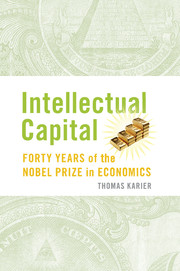Book contents
- Frontmatter
- Contents
- Preface
- Economic Nobel Laureates
- 1 An Economic Prize
- 2 Free-Market Economics
- 3 Micro: The Chicago School
- 4 Stock Market Casino
- 5 More Micro
- 6 Behaviorists
- 7 Keynesians
- 8 Classical Revival
- 9 Inventors
- 10 Game Geeks
- 11 General Equilibrium
- 12 A World View
- 13 Numbers Guys
- 14 History and Institutions
- 15 Reshaping the Prize
- Notes
- Index
- Frontmatter
- Contents
- Preface
- Economic Nobel Laureates
- 1 An Economic Prize
- 2 Free-Market Economics
- 3 Micro: The Chicago School
- 4 Stock Market Casino
- 5 More Micro
- 6 Behaviorists
- 7 Keynesians
- 8 Classical Revival
- 9 Inventors
- 10 Game Geeks
- 11 General Equilibrium
- 12 A World View
- 13 Numbers Guys
- 14 History and Institutions
- 15 Reshaping the Prize
- Notes
- Index
Summary
A number of Nobel economists came of age during the coincidence of two powerful movements: the Keynesian revolution and the quantification of economics. Keynes had rewritten economic theory and challenged the principles of the old guard from Adam Smith to Alfred Marshall. He explained why free markets didn't always work, and, if there were any doubt, the Great Depression proved it. Gunnar Myrdal, a Swedish socialist and Nobel Prize winner, articulated a similar thesis in the 1930s.
Most of the new Keynesians, however, were in graduate school when they first heard the radical ideas coming out of Cambridge University in the 1930s and from Harvard University in the 1940s. Armed with their new theory, young economists like Robert M. Solow, James Tobin, Franco Modigliani, and K. Gunnar Myrdal set out to change the world. They summarized, refined, and extended Keynesian economics while Lawrence R. Klein tried to program it into his big economic models with mountains of data.
The Keynesians were also part of the generation that believed that economics was a lot like physics. They saw little difference between calculating the maximum trajectory of a rocket and the maximum welfare of a nation. Almost immediately they translated Keynesian economics into variables and formulas, but they didn't stop there. Any economic idea that could be represented by an equation was fair game, including business and household behavior, economic growth, and international trade. For the most part, this work did not require original economic ideas, just really good math skills.
- Type
- Chapter
- Information
- Intellectual CapitalForty Years of the Nobel Prize in Economics, pp. 125 - 154Publisher: Cambridge University PressPrint publication year: 2010



